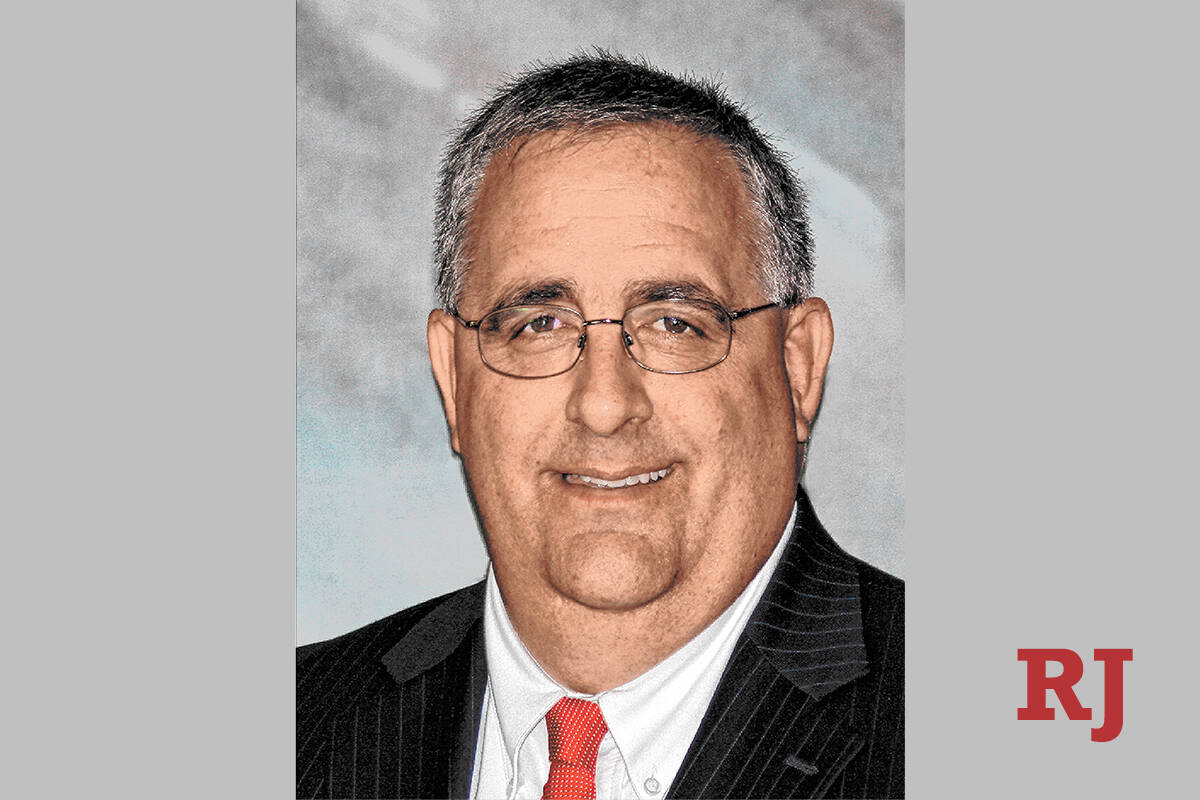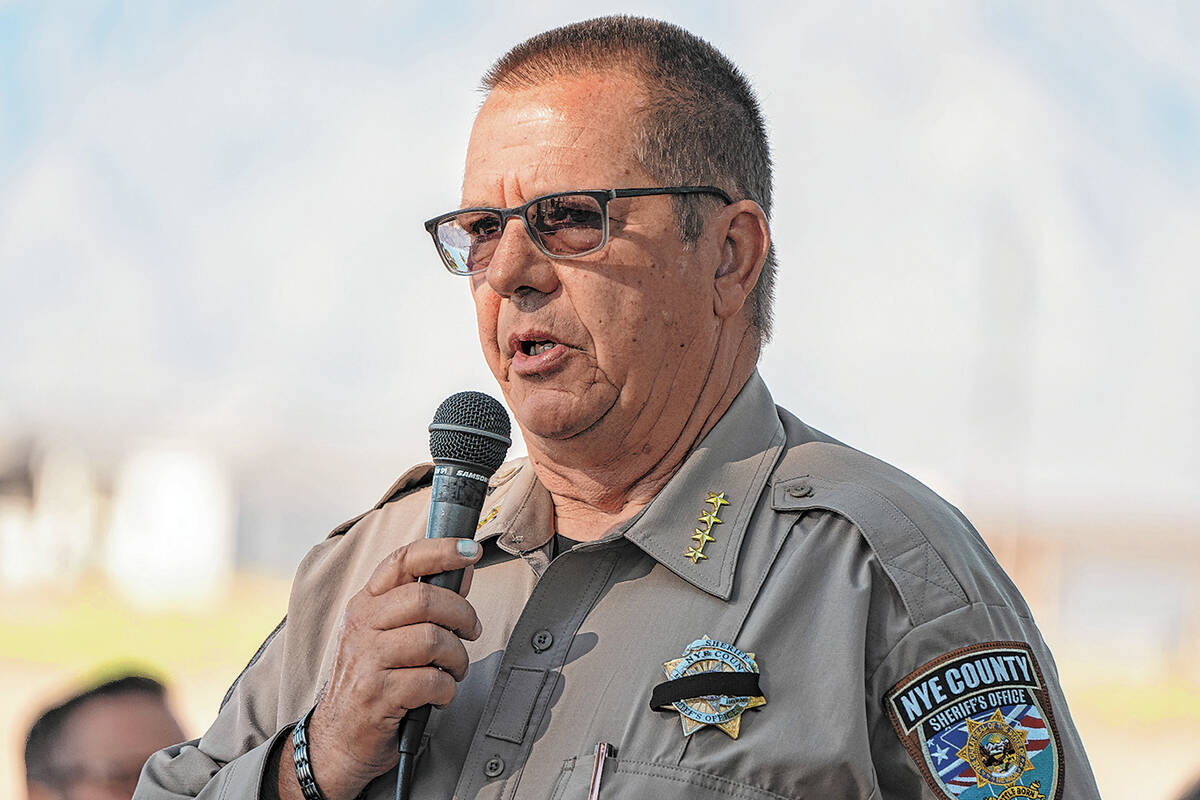Nye sheriff says district attorney prevents him from complying with state law
The Nye County district attorney has been blocking the sheriff’s office from releasing law enforcement records, which Sheriff Joe McGill claims is eroding trust in the community.
“There’s a certain level of transparency that we need to exercise, and he’s not allowing us to do that,” McGill told the Las Vegas Review-Journal in a recent phone interview.
McGill said that since Nye County District Attorney Brian Kunzi took office last year, he has prevented sheriff’s staff from releasing law enforcement documents such as arrest reports to the media or public, despite Nye County releasing such records in the past.
In late May, the Review-Journal requested 10 arrest reports from the Nye County Sheriff’s Office. Days later, the office declined to release the records, citing open investigations and ongoing criminal proceedings.
“Such materials are not public records until the completion of the prosecution or the closure of the matter without prosecution,” read a letter from the sheriff’s office.
In Clark County, the various justice courts and the Metropolitan Police Department regularly release arrest reports and warrants soon after a person’s arrest, with some identifying information removed. Under Nevada law, a government agency cannot deny access to a confidential public record if the confidential information can be redacted.
In a written statement sent to the Review-Journal, Kunzi said his pushback against releasing law enforcement records “is not with the disclosure, but only with the timing of the release of records.” He said records should not be released until the enforcement proceeding, meaning a criminal trial, has been completed. But that often takes months or even years.
He also argued that disclosing arrest reports could affect criminal cases by revealing the “scope and direction of the investigation,” and allowing defendants to “destroy or alter evidence, fabricate fraudulent alibis and intimidate witnesses.”
“It is not fair to suggest that I assume these risks or also to use the press to influence the public that could interfere with my obligation to provide a fair trial before an unbiased jury that may be influenced by the premature release of facts of the case,” he wrote in the statement.
Kunzi declined a phone interview about his statement and would only answer follow-up questions in writing.
After the Review-Journal began asking questions, Kunzi said he is not against releasing records with redactions, but that it would be the responsibility of the sheriff’s office to redact reports.
“This is something I will discuss with the (sheriff’s office) since it seems there is some confusion or deflection occurring so that I could help resolve the issues you raise,” Kunzi said in an email to the newspaper. “Unfortunately I can lead the proverbial horse to water but I am powerless to make them drink. I am serious about trying to fix any breakdown that may be occurring.”
Review-Journal Chief Legal Officer Ben Lipman said access to records allows the public to evaluate for themselves if police and prosecutors are doing their jobs correctly, and that hiding records “undermines our justice system.”
“And it should go without saying that the records need to be available to the public without delay,” Lipman said. “That is why the United States Supreme Court has made clear that news delayed is news denied, and that is why the Nevada Public Records Act requires that public records be provided within five business days — not weeks, months or years later when the government decides it is no longer concerned about public scrutiny.”
New DA, new policy
McGill said Kunzi has made the same argument — that releasing records could compromise ongoing prosecutions — since he started pushing for records requests to be denied earlier this year. McGill said Kunzi’s position as district attorney gives him some control over the release of records.
“He is my attorney, he is the attorney for the county and he is the attorney for me when push comes to shove,” McGill said. “If someone sues the sheriff’s office, he’s the one to stand up and defend it.”
In a follow-up statement emailed by Kunzi, he said the sheriff’s office is not prevented from releasing information “that provides basic facts of what happened,” but he argued that records containing “witness statements and investigative reports” are not public records until the criminal proceedings are complete.
“My position has been very much misconstrued,” Kunzi wrote in the statement. “I have never said information cannot be released to the public. I have only insisted that what is released does not interfere with my ability to do my job.”
Kunzi was elected to office in 2022, defeating incumbent Chris Arabia. He had previously served as Nye County’s district attorney, losing a re-election bid in 2014.
Arabia told the Review-Journal that there was less interference in sheriff’s department record requests when he was in charge of the office.
“When I was in office, the sheriff’s office generally released the reports,” Arabia said. “And I favor transparency, so I didn’t see any reason to stop that.”
Alleged overreach
Kunzi said that his office began “having issues” with a lack of details in reports that were reviewed by judges to establish probable cause for a defendant’s arrest, leading to judges “being forced to release the prisoners from pre-trial confinement.” He said that reports without adequate details were common under the prior sheriff’s office administration.
But adding more details to reports will now “disclose facts of the case and investigation that is not appropriate before the matter has been reviewed by my office for charging purposes,” Kunzi said.
McGill also alleged that in February, Kunzi implied he would seek prosecution against a sheriff’s office employee who released an arrest report to another employee. The employee who sought the report was the alleged victim in a domestic violence incident, McGill said.
He said the employee who released the report was not prosecuted, but he still felt the incident was an “overreach” on Kunzi’s part. Kunzi disputed that he implied he would prosecute an employee.
McGill said he agrees with Kunzi that information should not be released that could harm a criminal investigation. But he also said that being transparent with the community helps build trust with the citizens of Nye County.
“I don’t want to come to a point where we can’t efficiently do our job because he’s refusing to let us do our job,” McGill said.
Contact Katelyn Newberg at knewberg@reviewjournal.com or 702-383-0240.
The “What Are They Hiding?” column was created to educate Nevadans about transparency laws, inform readers about Review-Journal coverage being stymied by bureaucracies, and shame public officials into being open with the hardworking people who pay all of government’s bills. Were you wrongly denied access to public records? Share your story with us at whataretheyhiding@


















